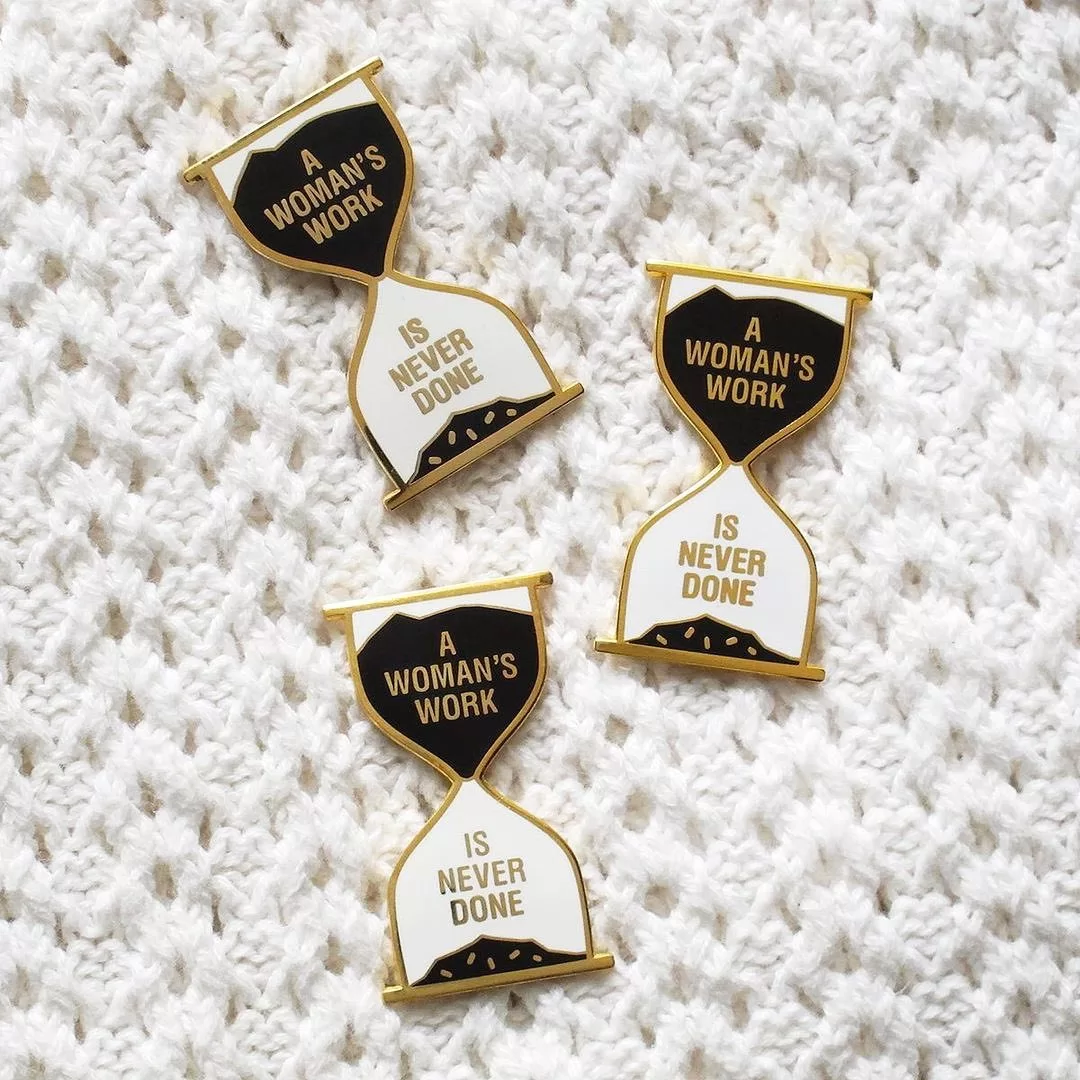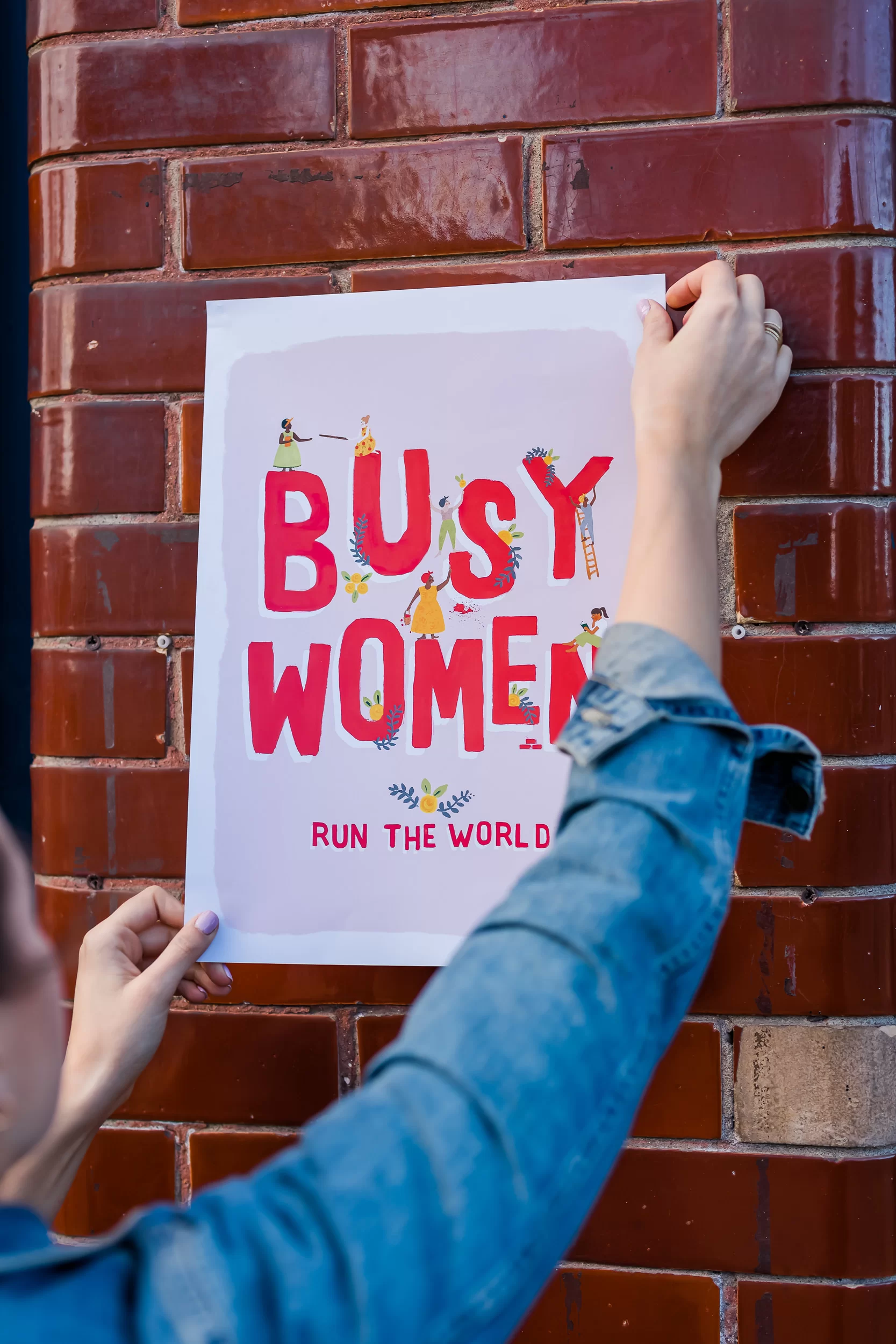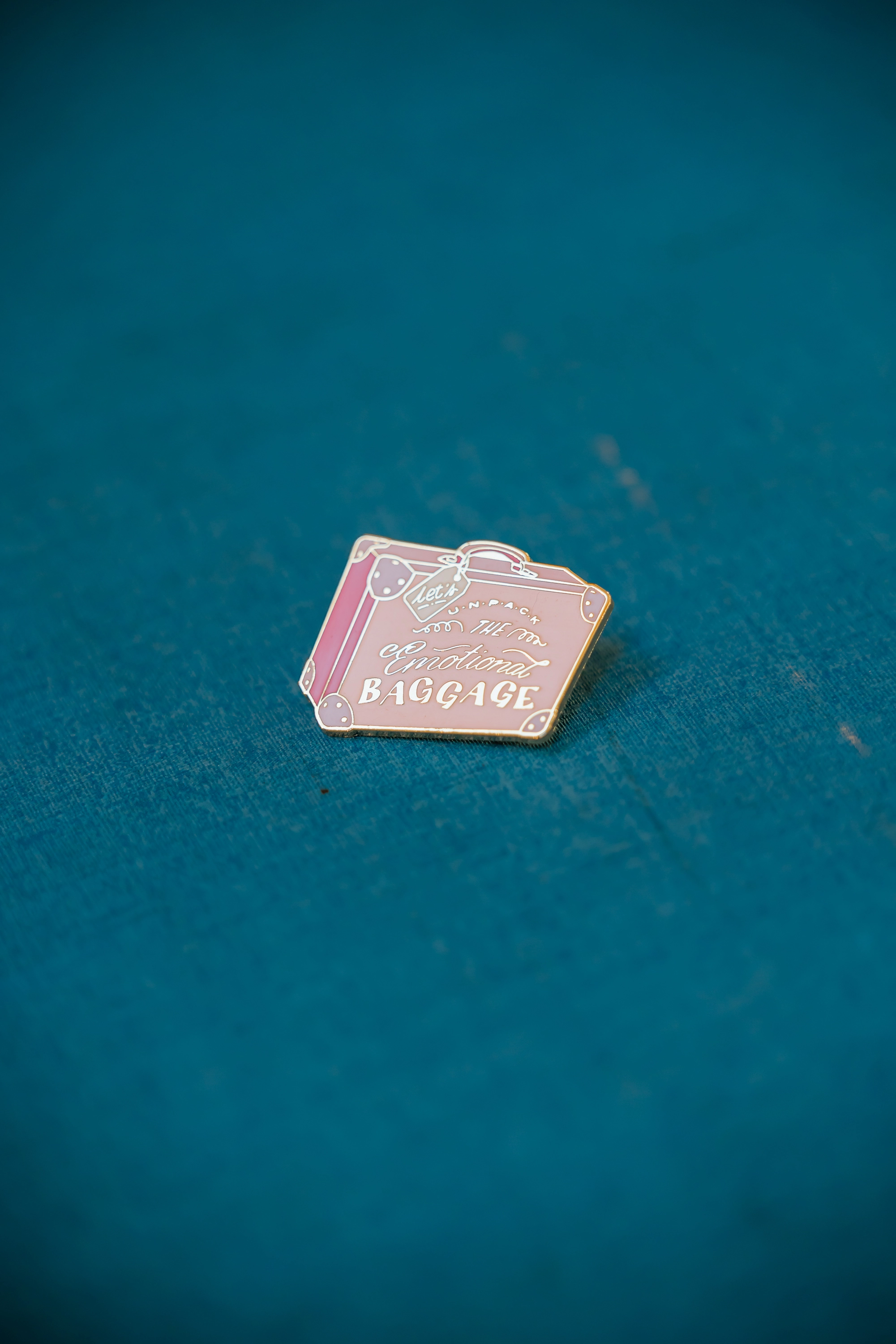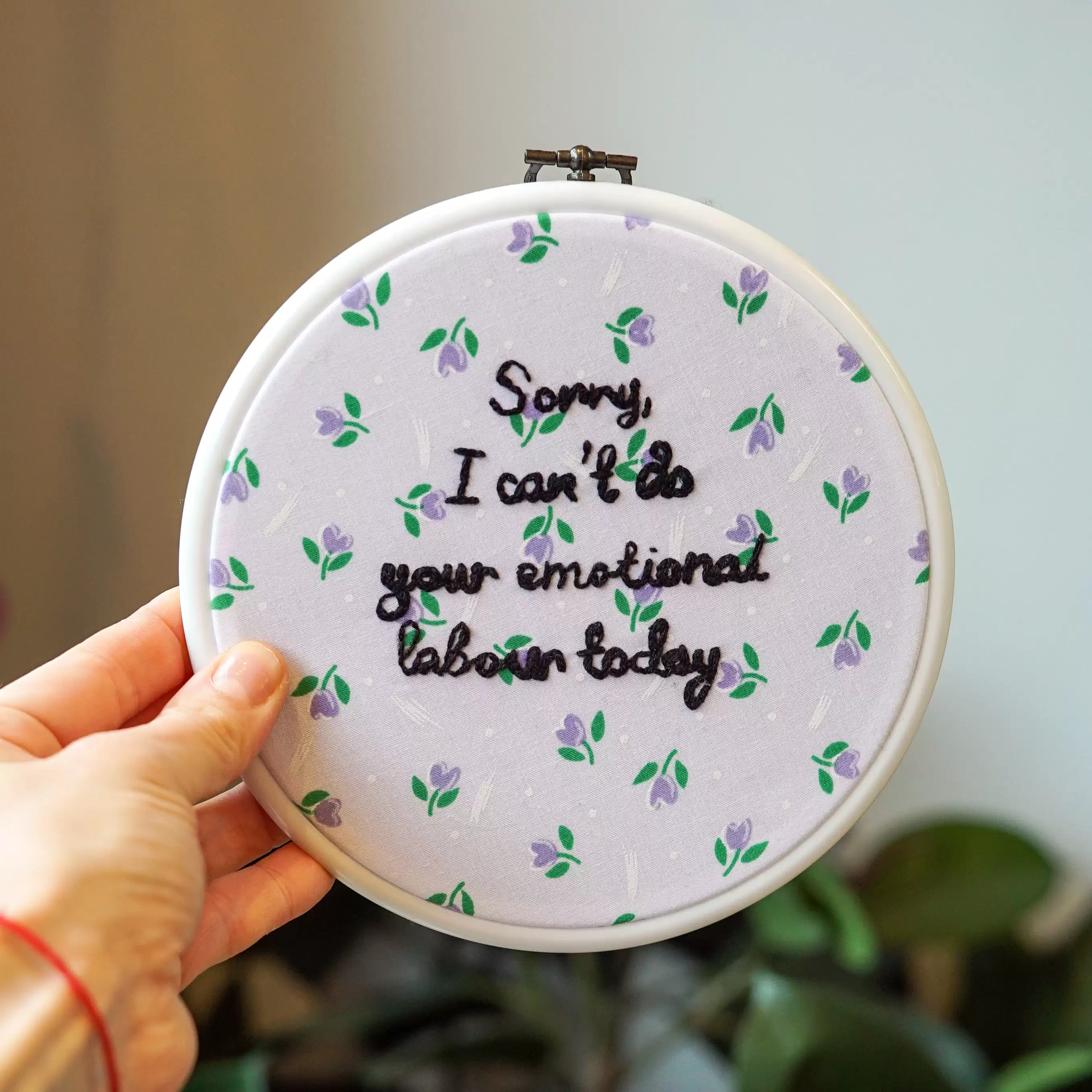NEXT DROP 6TH MARCH 7AM. JOIN CLUB HOLLY & CO FOR ACCESS

Emotional labour: the real reason a woman’s work is never done
Feeling overwhelmed
By Holly Tucker
UPDATED 13TH SEPTEMBER 2023
What is emotional labour? The hours of invisible work done mostly by women to keep life on track and cater to feelings. It’s the thinking, the emotional wrestling, the constant figuring shit out as well as all the physical to-do’s. Here’s my take on it and more importantly, some solutions.

Emotional labour and why women carry the mental load
Is it just me, or is that to-do list eternal? I know I’m not alone when I type furiously about this subject and yet, how has this not become the conversation we have with our daughters, and their daughters? I know my mum was the same and I think back to the endless chores / managing of feelings, the nitty gritty of life that she’d suck up and the little thanks she’d receive! I wish it was different, but so far I’ve fallen into the trap and it’s not obvious how to get out of it, without the support of everyone around me.
It’s time to wake up and become educated in ‘emotional labour’, the title given to the hidden work women did, continue to do and will do, until it is ‘outed’ — with solutions shared and encouraged. I think I’m on my way, but I still have far to travel and I want to bring you on the journey with me, too.
The impact of lockdown on women’s lives
Firstly, I’d say I’ve never felt the burden of ‘woman’s work’ more than I did through the pandemic, which added so many tasks to our daily lives, many unseen, and disproportionately falling on women. In fact, global data from UN Women suggests that the coronavirus pandemic could take gender equality back 25 years… back to another era actually! And I felt it. Even though I don’t have a classic household thanks to Frank being at home, I still found myself with the never ending list of tasks.
Women’s invisible labour examples: to-do list items that fall to the woman of the house
These are the kinds of things I need to think about now that I know nobody else in our household is thinking about…
- Book dog training, as I think Frank and I will have the shortest marriage if the dogs don’t stop barking when the doorbell goes. Also highlights my shopping addiction!
- Fix the bloody doorbell, as the amount of Royal Mail red cards I’m getting through might seem like I’m addicted to shopping… Did I mention this already?
- Harry’s school trousers still do not fit him — buy some.
- Need to send back the ones that were too big.
- Change hallway lightbulb.
- Write to school about the insane A level plans.
- Send Granny Mary flowers as she’s in her new care home.
- Work out money and broach the subject carefully (this is an aside, but read our article on why finance is a feminist act for more on this!)
- Check Harry actually sent Aunty Gerry that blinking CHRISTMAS thank you!
- Pop over to Mum and Dad’s for a cuppa, as Dad sounded down.
- Need to change energy providers as the bill is too high.
- Buy the soap for hand-washing clothes, as even though I add it to the list each week, it’s always forgotten.
- Send a card to a friend’s mum who is going through a terrible time.
- Get stamps.
- The f**king dog food that was meant to be on subscription, so I did not need to order it, keeps not arriving thanks to Brexit and so the dog is going to go hungry tonight. Need to get into town and buy some urgently, can’t leave it to anyone else, as they’ll get the wrong type!
- Haven’t messaged Frank back!
Oh and it goes on, doesn’t it?
It’s time to wake up and become educated in ‘emotional labour’, the title given to the hidden work women did, continue to do and will do, until it is ‘outed’ — with solutions shared and encouraged.
Why women struggle when it comes to delegating
I've got a sneaky suspicion I know some of the reasons:
- So many things you know shouldn’t be on your list, you seem to not be able to let go of.
- Or is it the pain of knowing if you don’t do it that it won’t be done in the way you want it to be done?
- Or it won’t be done in a timely manner… as in, ever!
- Or what about if it’s the things that are not tasks, more the ‘thinking’ to-do list? Not only remembering everything that needs to be done but also all of the time it takes to really consider how you’ll address the elephant in the room on some family politics or if that friend is really ok?
- Or what about the right strategy when it comes to addressing an issue your child has at school and nailing the age-old balance between being really angry and not making your child hated in the teacher’s break room?!
Be it ‘real’ things to do, or the time it takes to think ‘well’ and do what us women are so fabulous at, the fact remains it’s labour of these types which takes time away from your soul, your work and I suppose, your living.
What is emotional labour (really)?
Emotional labour is a term I only learned in my forties, and it tends to be a very female issue. It covers all the things we often ‘just do’ as women — from remembering birthdays, wrapping the present and writing the card, to organising playdates, looking after our parents, constructing the shopping list and making the costume for World Book Day! All of this unpaid labour falls (usually) disproportionally on women. They are the duties that are expected of us but go unnoticed; free, invisible work women do to keep track of all the little things in life that, taken together, amount to the big things in life.
Where does the term ‘emotional labour’ come from?
The term itself isn’t new — it was coined in 1983 by sociologist Arlie Hochschild in her book The Managed Heart: Commercialisation of Human Feeling and, as she conceived it, referred to ‘the work of managing one’s own emotions that were required by certain professions’, such as flight attendants being expected to smile and be friendly even in stressful situations.
Since then, it has been popularised by US journalist Gemma Hartley, who used the term in a different way in a 2017 Harper’s Bazaar article titled ‘Women Aren’t Nags — We’re Just Fed Up’. In this, she linked emotional labour to housework and ‘life admin’. In her book ‘Fed Up: Emotional Labour, Women, and the Way Forward’, she distils it quite perfectly as ‘emotion management and life management combined’ and writes about a specific kind of frustration felt when this life admin, and all the research and thankless ‘nagging’ required to keep on top of it, builds up. Managing this ‘invisible work’ leaves you feeling tired, grumpy and, funnily enough, emotional!!

So many things you know shouldn’t be on your list, you seem to not be able to let go of! Or is it the pain of knowing if you don’t do it either it won’t be done in the way you want it to be done?

How to share the emotional labour with a partner more fairly
I found myself talking to Frank about this emotional or invisible labour. I asked him to never forget to feed the dogs at 6pm sharp, if I don’t. That I needed him to be as militant as I am in this, because it mattered to me (to us), but I needed it to be one thing I could forget about. I explained there are things in my life that I need to press the delete button on, but could only do this with his help.
Frank has, to this day, not forgotten and I have started to relax about Mr Mudley's mealtimes. I’ve promised myself that once a week I’ll tackle one other thing with Frank or Harry. So far, we’ve talked about Harry’s exams and how I needed him to keep Harry to his revision plan (which he did). I needed to rely on him, to play ‘bad cop’ and to not be the sweet dad he is and allow Harry to talk his way out of revision (which he mostly stuck to)! Then slowly, gradually, these types of jobs should become less ‘woman’s work’ and more ‘parents’ work’ which is surely as it should be.
It’s the same in the workplace. Our office is 99% female so it’s not really an option for us but it shouldn’t ever just be the women making sure we’ve got a card for a team member’s birthday or knowing someone might be quiet as their child’s away without them for the first time ever. This kind of empathetic thoughtfulness needs to be more evenly split.
Invisible labour? How to reduce the burden by ordering subscriptions
Another game changer in my life has been the power of subscriptions. All the things I used to have to remember, now just arrive. I don’t have to use my brain cells on the mundane; the invisible tasks of our lives. Currently in my life, these are the things I subscribe to:
- Loo paper — the totally brilliant social purpose company Who Gives A Crap
- Dog Food — James & Ella or Lily’s Kitchen (and do listen to my Conversations of Inspiration podcast with the founder of Lily’s Kitchen Henrietta Morrison to see why)
- Veg Boxes — Abel & Cole or Magnificent Marrow (do listen to my podcast with Keith Abel too as he’s an incredible soul)
- Food Boxes — Mindful Chef (again, my podcast with these two wonderful founders, Myles Hopper and Giles Humphries, is what makes me order)
- Razors — Harry goes through so many, I rely on Harry’s Razors (wonder why!)
- Flowers — Freddie’s Flowers (Freddie Gardener is fascinating and you can hear his Conversations of Inspiration episode here)
- Coffee — Grind Coffee
- Books — Daunt Books monthly surprise bundle (do listen to my podcast with James Daunt)
- Wine — Naked Wine or Wine@heart (and we’re not shy in ordering…)
I explained there are things in my life that I need to press the delete button on, but could only do this with his help.
A solution for reducing emotional labour for women? Delegate, automate, ditch or subscribe
So the question for today is — can you delegate, automate, subscribe or drop at least one thing that’s on your never-ending to-do list? One of the hardest things about being overwhelmed is that it puts blinkers on us. We can’t see the bigger picture and can become fixated on really small things adding even more pressure to ourselves. We gain comfort in being worker bees, doing all the invisible stuff of life and being ‘busy fools’ — and avoiding this is one of the greatest pieces of business advice I've been given.
How women can take control of our futures
We have to remember, there are no gold stars. We’re not racking up points and so it is for us, and only us, to take control and ‘do different’. Surely we know by now, that we have to give ourselves permission to do less, enabling us to teach our daughters the different way. If we don’t owe ourselves that, surely we owe it to them?
Emotional labour: key takeaways…
Here are the three things that it pays to remember.
1. Understand emotional labour and recognise all the things on your to-do list that you just ‘do’:
Look at your list and all the tasks you take on to see the extent of the issue.
2. Be prepared to relinquish control on some things:
Be honest. Ask yourself what you really care about enough to keep doing or what you could give up for the greater good.
3. Work out how you can delegate, automate, ditch or subscribe:
You’ll be amazed at how this reduces your list to a more manageable size and even out the work more fairly. I wish you all the luck!


Images: ‘A Woman’s Work Is Never Done’ pin badge — by Word for Word Factory, ‘Busy Women’ print — by Jade Fisher, 'Let's Unpack The Emotional Baggage' — by Liz Harry, 'Vanish The Guilt' — by Emma Giacalone, stitched hoop — by Craft The Revolution.
Related content
MORE ARTICLES BY EMOTION

The golden age of redundancy: is redundancy a blessing in disguise?
Feeling uninspired

How to combat loneliness when running a business
Feeling lonely

Why I believe in living a life less ordinary
Feeling Uninspired

Why bravery in business is the ultimate superpower
Feeling scared

The slow and steady route to a self-sufficient business
Feeling Uninspired

How to collaborate with other businesses
Feeling lonely

Achieving work-life balance: how I found my good life
Feeling uninspired
Be the first to know
Sign up to our emails for brand new small business magic and inspiration. And if you create an account, you’ll also get exclusive product drops, discounts and more from Club Holly & Co, too.
